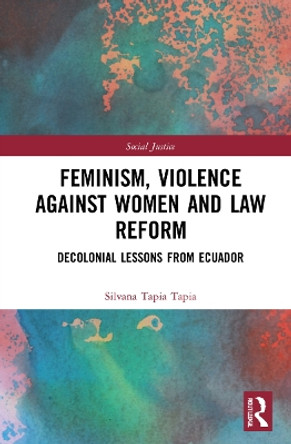Description
Offering an important addition to existing critiques of governance feminism and carceral expansion based mainly on experiences from the Global North, this book critically addresses feminist law reform on violence against women, from a decolonial perspective.
Challenging the consensus that penal expansion is mainly associated with the co-option of feminist campaigns to counteract violence against women in the context of neoliberal globalisation, this book shows that long-standing colonial narratives underlie many of today's dominant legal discourses justifying criminalisation, even in countries whose governments have called themselves "leftist" and "post-neoliberal". Mapping the history of law reform on violence against women in Ecuador, the book reveals how the conciliation between feminist campaigns and criminalisation strategies takes place through liberal legality, the language of human rights, and the discourse of constitutional guarantees, across the political spectrum. Whilst human rights make violence against women intelligible in mainstream legal terms, the book shows that the emergence of a "rights-based penality" produces a benign, formally innocuous criminal law, which can be presented as progressive, but in practice reproduces colonial and postcolonial paradigms that limit and reshape feminist demands. The book raises new questions on the complex social and political factors that impact on feminist law reform projects, as it demonstrates how colonial assumptions about gender, race, class, and the family remain embedded in liberal criminal law.
This theoretically and empirically informed analysis makes an innovative contribution to feminist legal theory, post-colonial studies, and criminal law; and will be of interest to activists, scholars and policymakers working at the intersections between gender equality, law, and violence in Latin America and beyond.
About the Author
Silvana Tapia Tapia is Assistant Professor of Law at Universidad del Azuay (Ecuador). She holds a PhD in Socio-Legal Studies from the University of Kent (United Kingdom), a Master's in Criminal Law, and a Bachelor's in Law from the University of Azuay. In 2021 she was awarded a Leverhulme Early Career Scholarship to conduct research on violence against women and human rights penalty, hosted by the University of Birmingham.
Reviews
"Feminism, Violence Against Women and Law Reform is a testament to the power of feminist decolonial thinking in a resiliently patriarchal, colonial and violent world. Its central argument is devastating. Whether in the form of reactionary criminalisation or in the apparently more progressive guise of human rights advocacy, liberal legality continues to dominate the public debate about violence against women. Indeed, neither the demise of formal colonialism nor the effort to transcend neoliberalism has done anything to undermine this dominance, let alone the impervious levels of violence that women all over the world continue to face. What then? An epistemic break in the form of a decolonial feminist abolitionist agenda - this is Tapia Tapia's answer. To get there and beyond is everyone's task."
- Luis Eslava, Reader in International Law, Kent Law School, University of Kent.
"In this innovative and wide-ranging socio-legal history of initiatives tackling violence against women in Ecuador, Silvana Tapia Tapia makes a key contribution to the growing field of post-colonial legal studies. In her illuminating analysis of the Ecuadorian case, she problematizes what has been taken in much literature to be an analytic association between neoliberalism and the feminist embrace of penality, suggesting instead that, even in the context of left-wing governments, penal expansion in the field of violence against women has been fed by both colonial discourses and, ironically, the appeal to human rights. Her book has important implications both across and beyond Latin America."
- Nicola Lacey, School Professor of Law, Gender and Social Policy, LSE.
"Tapia Tapia's excellent book is a vital intervention on a contemporary topic of the utmost importance and urgency: the deployment of carcerality in the name of liberation. Focusing on the feminist alliance with the State's carceral power over the course of significant political change in Ecuador, the study's account of the process, pitfalls and alternatives to this alignment is based on painstaking research and remarkable critical insight. Tapia Tapia's findings, particularly regarding the lure and ramifications of penality for progressive agendas, are sensitive to the context in which her research is embedded, but also carry significant implications for anyone seeking to understand and fight oppression anywhere. Ultimately, the author eloquently delivers a call to 'unlearn' and undo rights-based penality, embracing a counter-carceral approach that transcends the pull of liberal legality and reimagines both emancipation and protection through a decolonial feminist lens."
- Natasa Mavronicola, Reader in Law, Birmingham Law School, University of Birmingham.
Winner of the 2023 Hart-SLSA Book Prize
"Feminism, Violence Against Women and Law Reform is a testament to the power of feminist decolonial thinking in a resiliently patriarchal, colonial and violent world. Its central argument is devastating. Whether in the form of reactionary criminalisation or in the apparently more progressive guise of human rights advocacy, liberal legality continues to dominate the public debate about violence against women. Indeed, neither the demise of formal colonialism nor the effort to transcend neoliberalism has done anything to undermine this dominance, let alone the impervious levels of violence that women all over the world continue to face. What then? An epistemic break in the form of a decolonial feminist abolitionist agenda - this is Tapia Tapia's answer. To get there and beyond is everyone's task." Luis Eslava, Reader in International Law, Kent Law School, University of Kent, UK.
"In this innovative and wide-ranging socio-legal history of initiatives tackling violence against women in Ecuador, Silvana Tapia Tapia makes a key contribution to the growing field of post-colonial legal studies. In her illuminating analysis of the Ecuadorian case, she problematizes what has been taken in much literature to be an analytic association between neoliberalism and the feminist embrace of penality, suggesting instead that, even in the context of left-wing governments, penal expansion in the field of violence against women has been fed by both colonial discourses and, ironically, the appeal to human rights. Her book has important implications both across and beyond Latin America." Nicola Lacey, School Professor of Law, Gender and Social Policy, LSE, UK.
"Tapia Tapia's excellent book is a vital intervention on a contemporary topic of the utmost importance and urgency: the deployment of carcerality in the name of liberation. Focusing on the feminist alliance with the State's carceral power over the course of significant political change in Ecuador, the study's account of the process, pitfalls and alternatives to this alignment is based on painstaking research and remarkable critical insight. Tapia Tapia's findings, particularly regarding the lure and ramifications of penality for progressive agendas, are sensitive to the context in which her research is embedded, but also carry significant implications for anyone seeking to understand and fight oppression anywhere. Ultimately, the author eloquently delivers a call to 'unlearn' and undo rights-based penality, embracing a counter-carceral approach that transcends the pull of liberal legality and reimagines both emancipation and protection through a decolonial feminist lens." Natasa Mavronicola, Reader in Law, Birmingham Law School, University of Birmingham, UK.
"Tapia Tapia's impressive research in Feminism, Violence Against Women, and Law Reform: Decolonial Lessons from Ecuador provides a paradigm for how to move beyond a superficial 'for or against criminal law' debate, with its rich material, theoretical insights and well-founded critique that goes to the heart of liberal law." Linnea Wegerstad, Associate Professor of Criminal Law, Lund University, Sweden.
Book Information
ISBN 9780367566500
Author Silvana Tapia Tapia
Format Paperback
Page Count 172
Imprint Routledge
Publisher Taylor & Francis Ltd
Weight(grams) 453g




